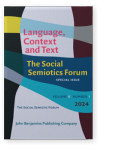Acknowledging dispossession
A CDA/PDA perspective on discourse dealing with unceded land
This paper illustrates what can be revealed by a linguistic analysis of the discourse strategies deployed in a
bilingual text acknowledging the dispossession of Indigenous peoples in Mindanao (Philippines). The analysis draws on systemic
functional linguistics (SFL) descriptions of English, which model language as a resource for making meaning. It explores the
choices involved from the perspective of critical discourse analysis (CDA), exposing language in the service of power, and
positive discourse analysis (PDA), appreciating language as an instrument of social change. In doing so we exemplify the role of
SFL-informed CDA/PDA in processes of reconciliation, including personal and public acknowledgements and apologies, alongside
considerations of “making peace” with dispossessed Indigenous people through existing, renovated or emerging genres.
Article outline
- 1.Unceded land
- 2.Recognition
- 3.Growing up in Davao
- 4.Autobiography
- 5.History
- 6.Stiches and seams
- 7.Whose history?
- 8.Confession
- 9.Critique and design
- Permission
- Notes
-
References
